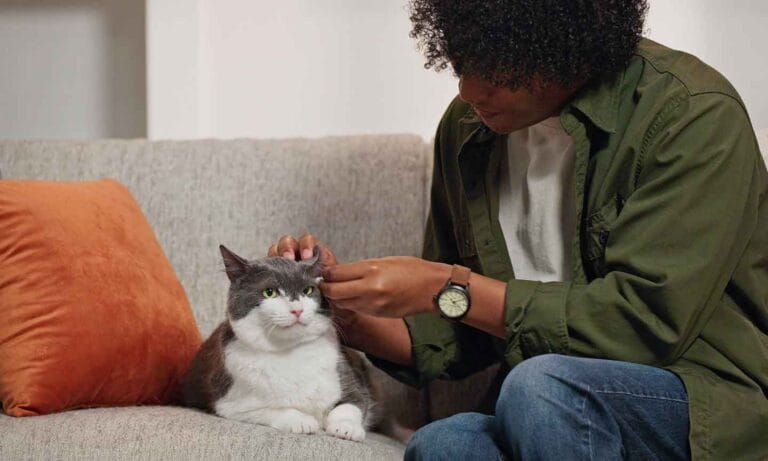Roundworms in dogs and cats are common parasites that spend their adult lives in the animal’s intestines. Tubular in shape, adult roundworms resemble small pieces of cooked spaghetti and can seen in an infected pet’s vomit or feces.
Dogs and cats can carry several species of roundworms, some of which cause illness in pets as well as people. Read on to learn the causes, symptoms, treatments and prevention of roundworms in cats and dogs.
Causes of Roundworms in Dogs and Cats
An infected dog or cat sheds roundworm eggs via its feces into soil. Other animals can become infected by ingesting the eggs from contaminated soil. This happens when pets groom themselves, sniff or lick the ground, or eat grass and other contaminated objects outside, including water.
Roundworms in cats (and dogs to a lesser degree) also can occur when they eat infected prey, such as birds and rodents.
Once eaten, roundworm eggs hatch in the digestive tract. In most cases, the worms then travel through the liver and the lungs. Once in the lungs, the young worms are coughed up and swallowed, eventually making their way to the small intestine where they mature into adults and reproduce.
Puppies and kittens can contract roundworms from their infected mother during pregnancy or while nursing. If a single pup or kitten gets exposed to roundworms, it is very easy for the parasite to spread among the litter.
Clinical Symptoms of Roundworms in Cats and Dogs
Adult roundworms feed off partially digested food, robbing your pet of vital nutrients. This especially is harmful in growing puppies and kittens.
Because roundworms grow and reside in the intestines, infected pets may develop a “pot-belly” appearance. Other clinical signs of roundworms in dogs and cats include:
- Coughing
- Poor hair/coat
- Vomiting (with or without the presence of visible worms)
- Diarrhea (with or without the presence of visible worms)
- Weight loss
- Failure to thrive
Note: Not all infected animals show clinical signs.
Diagnosing Roundworms in Dogs and Cats
Fecal testing can detect roundworms in cats and dogs in most cases. However, even if testing doesn’t confirm parasites, your veterinarian still might recommend treatment as a precaution. The treatment is harmless to pets.
A common misconception is that if your dog is infected, you easily can spot the roundworms in dog poop. This usually is not the case. The best way to diagnose a pet is to have your veterinarian test him for parasites.
Transmitting Roundworms to Humans
People definitely can contract roundworms from pets, and children most commonly are infected. Like animals, if humans swallow the infected roundworm eggs, the larvae can invade the tissues and cause clinical disease. Children usually become infected from putting soil or sand contaminated with microscopic eggs in their mouths, which is why dogs are not allowed at children’s parks or sandboxes.
Rarely, immature roundworms might migrate to the liver, central nervous system, lungs and/or eyes. This can result in localized problems ranging in severity, such as liver disease or blindness.
Treating Roundworms in Cats and Dogs
Your veterinarian can recommend safe and effective roundworm treatment for dogs as well as finicky feline-approved flavored roundworm treatment for cats. Most medications available today target the adult worms and do not affect other life stages of the roundworm, thus making administration of repeated treatments necessary to fully ensure the animal no longer is infected.
How to Prevent Roundworms in Dogs and Cats
While many monthly heartworm preventive medications also control some of these parasites, no single medication can treat and prevent all GI parasites. Here are some tips for protecting your pets:
- Use a monthly prescription heartworm preventative that also targets GI parasites. The amount of medication in heartworm preventive will not clear a current roundworm infection but will protect contractions of the parasite.
- Use gloves and promptly pick up fecal material to reduce the risk of environmental contamination.
- Schedule regular checkups and fecal exams with your veterinarian. Even indoor cats can become infected with roundworms.
- Make children wash their hands well after playing outside and before eating.
- Before bringing any new pet into the home, have him tested for GI parasites as soon as possible.
- Do your best to prevent dogs and cats from killing and eating rodents and other small animals, as they commonly are infected with roundworms.
By: Dr. Laci Schaible
Featured Image: Anna Hoychuk/Shutterstock.com
Share:









